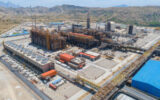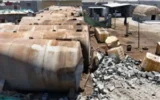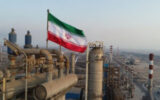
For years, mini-refineries have denied any gasoline exports and have denied accusations of fuel smuggling; but now the CEO of Shazand Petrochemical Company is openly saying that some of these units export gasoline to Afghanistan, and their exit routes are through the Dogharoon and Milak borders.

Gachsaran Petrochemical, a huge project with a billion-dollar investment that was supposed to produce one million tons of ethylene annually and feed four other petrochemical units, was halted and suffered losses after its early launch, despite the 13th government’s haste to complete it, due to lack of coordination in planning and lack of consumers. The petrochemical plant had drawn criticism from the National Petrochemical Industries Company, claiming that NPC was one of the factors that put Gachsaran in this situation. However, Saeed Baghbani, the director of production control at the Petrochemical Industries Company, denies these claims.

Hedayatullah Khademi, an energy expert, said: "We are a country that sells both crude oil and imports gasoline. Instead of trying to convert oil into more valuable products, we sell it raw and cheap. No matter how much oil China and the United States have, they buy several times more of it from abroad to convert it into a valuable commodity; but today we see that our country has been worn out in all areas of infrastructure and economy."

The short 12-day war between Iran and the Zionist regime, contrary to predictions, failed to disrupt the global oil market. This event showed that the Middle East is no longer the only determinant of global oil prices. In an interview with Hossein Mirafazli, an energy expert, we examined this major transformation and the future of the energy market. He talks about the stunning growth of renewable energies, especially solar, and the world's reduction in dependence on oil, and believes that these changes will transform not only the energy market, but also global political and geopolitical equations. Is the era of the Middle East's oil monopoly over?

Despite its high capacity for producing propane and propylene, Iran has been unable to produce polyurethane, a key material in various industries, and its heavy dependence on imports has revealed one of the missing links in the petrochemical value chain. According to Mohsen Ansari, a petrochemical expert, completing this chain could be a golden opportunity for economic development and reducing foreign dependence.

While value chain development has become a common buzzword in Iranian petrochemical industry literature, many projects, including MTO and MTP, are still stalled at the raw material sales stage. Petrochemical expert Mohsen Ansari considers “the need for large investments” and “feed instability” to be the most important reasons for the failure of these projects. According to him, in the current situation, the “ethylene” and “propylene” chains have the greatest potential for real completion in Iran and more focus needs to be placed on their development.

Maroon Petrochemical Company is one of the largest petrochemical production complexes in Iran, which was established on February 1, 1998, with the aim of implementing the Seventh Olefin Project.

While the government has resorted to imports to supply fuel, the widespread smuggling of subsidized diesel under the guise of mini-refineries is generating millions of dollars in profits for brokers every day; a structural phenomenon that exports national subsidies abroad with official permission.

While the Arash gas field has become a new flashpoint for border tensions in the Persian Gulf, Iran continues to insist on the path of diplomacy, a path that has neither thwarted the claims of Kuwait and Saudi Arabia nor stopped the plundering of the country’s energy resources. Isn’t it time for Tehran to deploy drilling rigs and defend its national wealth instead of fruitless talks?

The average price of Iranian heavy oil in 2024, based on statistics provided by the Organization of the Petroleum Exporting Countries (OPEC), was $79.71 per barrel.










